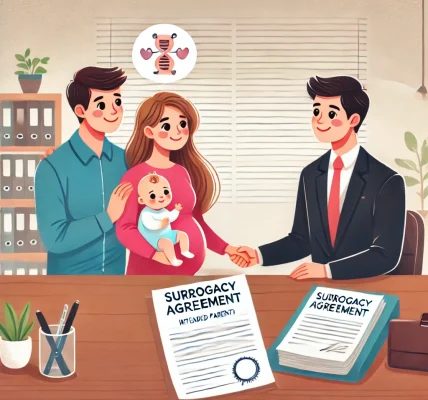Adoption is one of the most profound ways to build a family. It offers a life-changing opportunity for children who need care, love, and protection, while also fulfilling the dreams of prospective parents who wish to provide a nurturing home. However, the legal process of adoption can be complicated, involving various steps and considerations that must be handled with care and diligence. In this blog, we will explore the adoption process, the key legal steps involved, and essential considerations to ensure that the procedure is smooth, lawful, and ethical.
Understanding Adoption
Adoption is a legal process that permanently transfers parental rights from a child’s birth parents (or legal guardians) to adoptive parents. The child, once adopted, becomes a full member of the adoptive family, enjoying all the rights and privileges as a biological child. Adoption can take place through several avenues, including private adoptions, foster care, or international adoptions, with each path having specific procedures.
Why is the Legal Process of Adoption Important?
The legal process ensures that adoption is conducted fairly, and that the best interests of the child are always the priority. It also protects the rights of birth parents, ensuring they understand their choices and the consequences of giving up parental rights. Finally, it provides legal security for adoptive parents, ensuring that the adoption is final and that the child is legally recognized as part of their family.
Step 1: Determining Eligibility for Adoption
Before you begin the adoption process, it is essential to determine if you meet the eligibility requirements set by the state or country. While the criteria can vary, some common requirements include:
- Age Requirement: Adoptive parents must usually be a certain age. In many jurisdictions, you must be at least 21 years old, but there might be variations depending on the adoption type.
- Marital Status: Some places allow single individuals to adopt, while others may require you to be married.
- Financial Stability: You will likely need to show that you are financially stable enough to care for a child.
- Health Status: Physical and mental health evaluations might be required to ensure that you are capable of providing a safe environment for a child.
- Criminal Background Check: A criminal background check is typically required to ensure the safety of the child.
It is crucial to check the specific laws and regulations governing adoption in your jurisdiction, as these criteria can vary.
Step 2: Choosing the Type of Adoption
Once you determine your eligibility, you must decide on the type of adoption that suits your circumstances. The three primary types of adoption include:
1. Domestic Adoption
In domestic adoption, the child is adopted from within the same country. Domestic adoptions can either be agency adoptions or private adoptions. Agency adoptions are facilitated by licensed agencies, while private adoptions are typically arranged directly between the birth parents and adoptive parents, under the oversight of legal professionals.
2. Foster Care Adoption
Foster care adoption occurs when a child is placed in temporary care by the state and later adopted by the foster parents or another family. Foster care adoption is often the least expensive option, but it may require a lengthy waiting period and extensive evaluations.
3. International Adoption
In international adoption, parents adopt a child from a foreign country. This type of adoption is complex, involving not only legal procedures within the home country but also international laws, including immigration laws.
Each adoption type has unique procedures, costs, and requirements, so it’s essential to research each thoroughly to choose the best path.
Step 3: Completing Home Studies
A home study is a critical component of the adoption process. It is a comprehensive assessment conducted by a licensed social worker to ensure that you are fit to be an adoptive parent. The home study typically includes:
- Interviews with the adoptive parents: A social worker will interview all members of the household to assess their readiness and ability to care for a child.
- Home visits: The social worker will visit your home to evaluate the environment and ensure it’s safe and suitable for a child.
- Background checks: The social worker will conduct background checks to screen for any criminal history or child abuse records.
- Financial assessment: You may need to provide proof of income and financial stability to ensure that you can provide for the child’s needs.
- Health evaluations: Physical and mental health evaluations will be conducted to ensure that you are capable of providing a safe environment for a child.
The home study is an essential part of the adoption process, ensuring that only suitable individuals or families are approved for adoption.
Step 4: Legal Process of Termination of Parental Rights
Before an adoption can be finalized, the biological parents’ rights must be legally terminated. This step is crucial to ensure that the adoption is legally binding. In some cases, biological parents may voluntarily relinquish their parental rights. In other cases, parental rights may be terminated involuntarily, often due to abuse, neglect, or abandonment.
Once parental rights are terminated, the adoptive parents can begin the process of petitioning for adoption. Depending on the situation, the termination of parental rights can be a sensitive and emotionally difficult part of the adoption process. Legal professionals can help guide you through this challenging step to ensure it is done correctly.
Step 5: Filing an Adoption Petition
Once you’ve completed the home study and parental rights have been terminated, the next step is to file an adoption petition with the court. The petition should include:
- A request to adopt the child
- Background information about the adoptive parents
- A statement confirming that the birth parents’ rights have been terminated
- Other relevant documents, such as the home study report
Filing the petition is an important step in formalizing the adoption. You will need to pay filing fees, and the court will schedule hearings to review the case.
Step 6: Court Hearing and Finalization of Adoption
The final step in the legal adoption process is the court hearing. The adoptive parents and the child may be required to appear in court before a judge. The judge will review all the documents and home study reports to ensure that the adoption is in the best interests of the child. If everything is in order, the judge will issue a final decree of adoption, legally transferring parental rights to the adoptive parents.
Once the adoption is finalized, the child will receive a new birth certificate, listing the adoptive parents as the child’s legal parents.
Considerations in Adoption
While the adoption process is straightforward, there are several important legal and emotional considerations to keep in mind:
- Legal Assistance: Adoption can be a complex legal process, so it is essential to work with an experienced adoption lawyer to guide you through the legal steps, especially if you encounter any challenges or complications.
- Adoption Costs: Adoption can be expensive, especially in private and international adoptions. You should be aware of all potential costs, including agency fees, legal fees, and court costs.
- Emotional Support: Adoption can be an emotional journey, both for the adoptive parents and the child. It’s crucial to seek counseling or support groups to navigate the emotions that come with the process.
- Open vs. Closed Adoption: In an open adoption, the birth parents and adoptive parents have ongoing contact. In a closed adoption, there is no contact between the birth parents and the adoptive parents after the adoption is finalized. It is important to understand the differences and decide which option is right for your family.
Conclusion
Adopting a child is a life-changing event that brings immense joy and fulfillment. However, the legal process of adoption is a significant undertaking that requires careful planning, commitment, and attention to detail. By understanding the key steps and considerations involved, you can help ensure a smooth and successful adoption process that provides a loving, stable home for a child in need. Always remember that legal guidance and emotional support are crucial throughout the journey.




